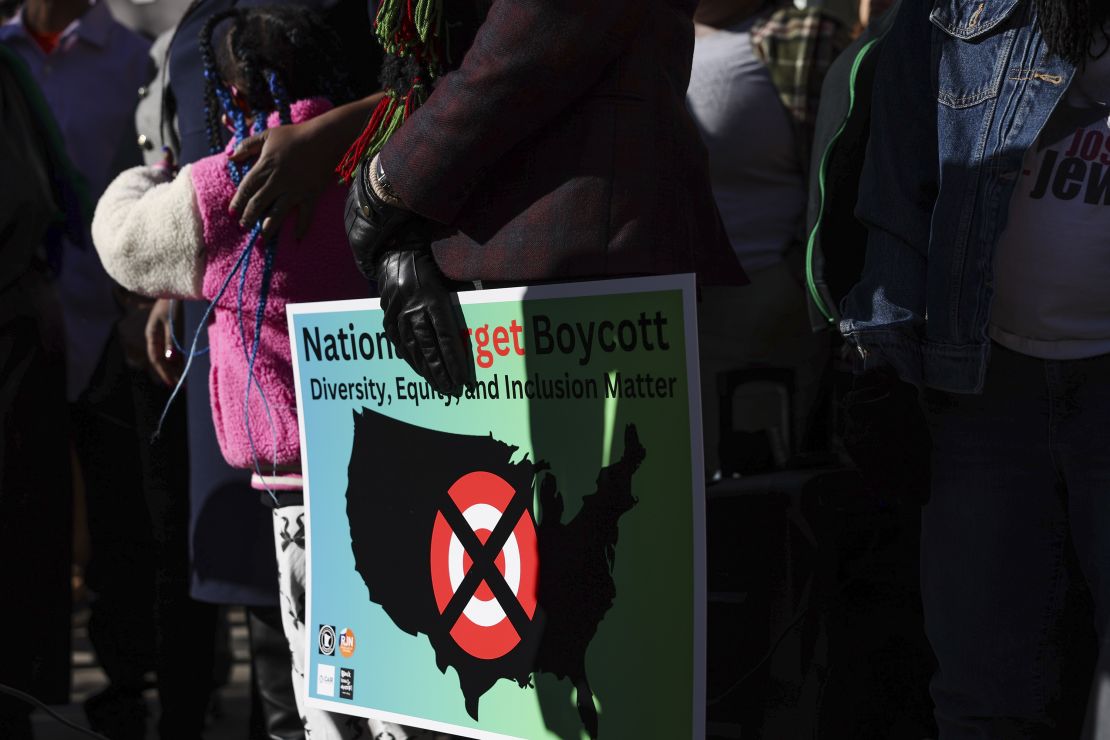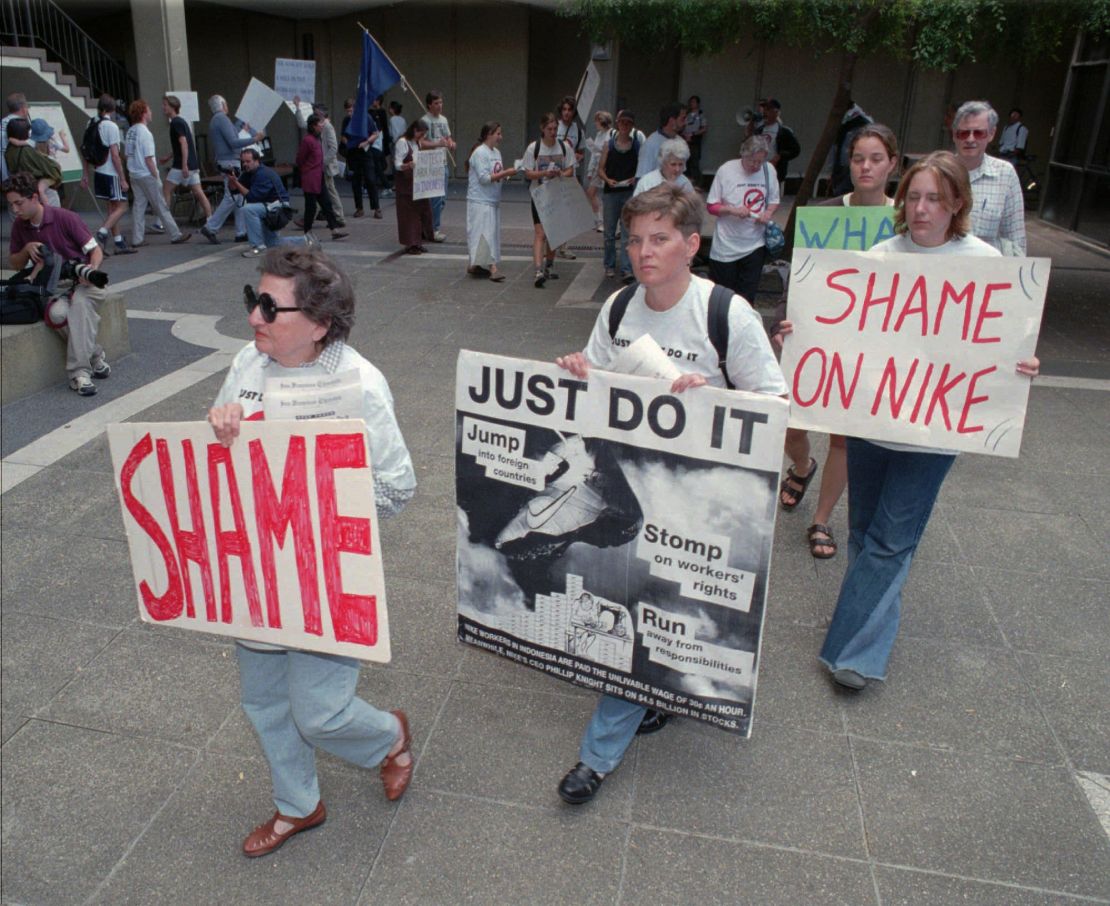New York
Cnn
–
At the beginning of February, John Schwarz, a self-described “Mindfulness and Facilitating Mediation”, proposed a 24-hour “economic interruption” throughout the country of chains on the last day of the month.
Schwarz called on people to give up spending on Amazon, Walmart, and all other big sellers and fast food companies for one day. He called on them to spend money only on small businesses and essential needs.
“The system is created to exploit us,” Schwarz, who switches from “TheoneCalledjai” to social media, in a video for about 250,000 followers on Instagram and Tiktok. “On February 28, we will remember those who really holds power. For one day, we turn it off.”
Schwarz, 57, has no background in social or political organization. By the beginning of this year, he almost exclusively posted videos of himself by offering inspirational messages and motivational tips sitting in his home, home backyard and shopping center parking lots.
He had low expectations for his boycott message gaining withdrawal. “I thought maybe a handful of my followers would do it,” he told CNN in a telephone interview this week.
Instead, Schwarz’s call was rapidly spreading online. His video has been shared more than 700,000 times on Instagram and has seen 8.5 million times. Famous as Stephen King, Bette Midler and Mark Ruffalo have encouraged people to participate. Reporters wrote and broadcast television pieces about the boycott, pushing it further.
The “economic interruption” attempt is relatively uncoordinated and blurred. Experts on customer boycotts and corporate strategy are suspicious of making a trace on the lower lines of the massive companies it aims for, let alone the broad American economy. Effective boycots are usually well organized, make clear and specific demands, and are focused on a company or issue.
But this boycott has gained online strength because it has captured visceral public anger with the American economy, corporations and politics.
“There is a feeling that many people want to do something. Doing something in the American context has often implied the use of pocket policy, “said Lawrence Glickman, a historian at Cornell University and author of” purchasing power: a history of consumer activism in America. ”
People online say they want to join the boycott for many different reasons. Some are commenting on high prices and cost of living. Others are angry about the power of large corporations and billionaires like Elon Musk. Some are trying against the Trump administration efforts to destroy federal programs and the fear of an autocracy in America. However, others want to boycott companies that attract their diversity, equality and inclusion policies (Dei).
Schwarz collided as a result of the response to create a group. He called it the People’s Union and describes it on its new website (often down) as a “Movement created by people, for people to” undertake) the action against corporate control, political corruption and the economic system “. He has collected about $ 70,000 in donations on a gofunding site that requires social campaigns, and other efforts. Specific, including Amazon and Walmart.
Although the online response seems to be stronger than the political left, Schwarz has no ideology that can be considered constantly progressive or conservative, at least along the traditional US political spectrum. He does not belong to any political party, but he supports Bernie Sanders. In recent posts, he has defended for the completion of the Federal Income Tax, Congress Term limits, universal health care and price lids.
The boycott is “spread so well because people have just had enough and they are saturated and they are tired,” Schwarz said.
The call of Schwarz’s boycott has coincided with a more organized attempt to punish the sellers who are withdrawn in Dei, especially target.
Dozens of Fortune 500 companies have returned to their diversity programs in response to pressure from activists and right -wing legal groups, and, most recently, the Trump administration threats to investigate what characterizes “illegal dei”, including possible criminal cases against companies.
Much of the anger is directed towards target. Target is under more heat than companies like Walmart, John Deere or Tractor Supply because it went further in its Dei efforts, and it has a more progressive customer base.
Target was a leading lawyer for Dei programs in the business world in the years after George Floyd was killed by police in the city of Minneapolis in 2020. Target also spent years building a public reputation as a progressive employer for LGBTQ issues.
But day in Trump’s presidency, Target announced that he was eliminating employment goals for minority employees, ending an executive committee focused on racial justice and making further changes to his diversity initiatives. Target said he remained dedicated to “creating a sense of belonging to our team, guests and communities” and also emphasized the need to “stay in step with the emerging external landscape”.

Target withdrawal sparked anger from clients and boycott calls, especially black customers.
Rev. Jamal Bryant of the new Baptist Church of the New East Missionary in Stonecrest, Georgia, has called for 100,000 people to start a 40-day target boycott on March 5 to coincide with the beginning of Lent. Participants are encouraged to buy products from black -owned businesses during this period.
“We have witnessed a disturbing withdrawal from the initiatives of diversity, equality and involvement (dei) from large corporations,” Petition says. “The biggest insult comes from target.”
The goal did not respond to CNN’s request for comment.
There are signs that the shock from the target movement can affect the company.
Customer visits to Target, Walmart and Costco have slowed over the last four weeks, but they have fallen mostly in target, according to placer.ai, who uses phone location data to follow visits. The slowdown can also be attributed to the weather, economic conditions and other variables, Placer.He warned.
During the week of February 10, the last week available, foot traffic to target RA 7.9% and 4.8% in Walmart. Foot traffic in Costco, which stood by his policies Dei, increased 4.8%.
The data “show a clear drop in traffic in late January to mid -February after the company’s step by Dei,” said Joseph Feldman, an analyst in Telsey Advisory Group, in a note to customers this week.
Despite the latest slowdown in target, boycots tend to be short -lived and rarely do financial damage to companies.
“It is very difficult to keep anything longer than a few weeks,” said Young Hou, a marketing professor at the Darden Business School at the University of Virginia, who studied consumer boycotts. Customers are usually unclear and do not want to spoil their routines for extended stretches, he said. Boycots can also turn on a counter, the main supporters of a company to mobilize and increase their expenses, denying the impact.
A boycott campaign against target can be difficult to support because other chains that consumers can switch to as Walmart or Amazon have also supported Dei programs.
The most successful example of a boycott in recent years has come to the right.
In 2023, the Bud Light AB Inbev’s parent company lost as much $ 1.4 billion as sale due to the right -wing response in Bud Light’s short partnership with transgender Dylan Mulvaney.

Entertainer Kid Rock posted a video of himself by shooting a stack of Bud’s light cases. Other right -wing popular activists such as Ben Shapiro and Candace Ownerns and Republican politicians, including Vice JD Vance and Governor of Florida Ron Desantis, publicly supported the boycott. The brand also angered left customers because of its reconciliation response to right -wing attacks.
One of the main reasons Bud Light’s boycott was successful was because it was very easy for customers to replace Bud Light with Coors Light or Miller Lite or another beer without much sacrifice.
However, customer boycotts and protests can raise public awareness of a matter, pressure companies to make changes or impair their public reputation.
During the 1990s and 2000s, for example, protests on the College campuses on the use of Nike the work of Sweatshop forced the company to raise the minimum age of employment of young workers in shoe factories in 18 and allow human rights groups to inspect the factory conditions in Asia. After Parkland, Florida, school shooting in 2018, consumers and activists under pressure successfully Delta, Avis, Metlife and other companies to remove ties with the National Rifle Association and recent discounts for NRA members.
“The more specific the reason for boycotting, the more effective they boycotts have a chance to be,” said Cornell University Glickman. “Boycoses rarely damage very powerful companies, but they can put them in defense.”